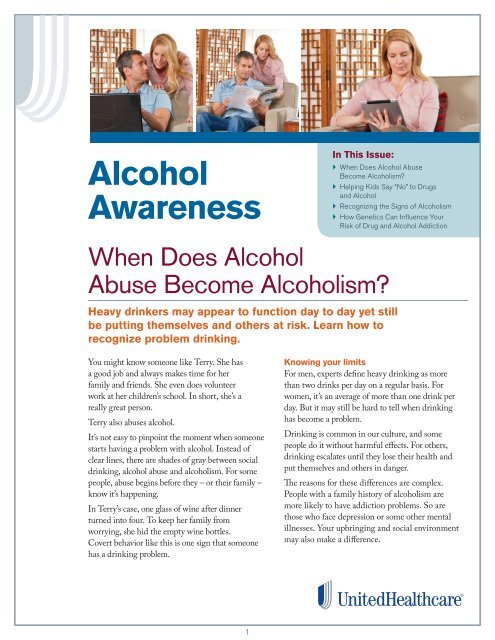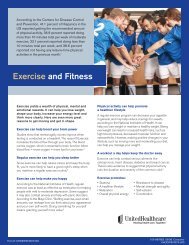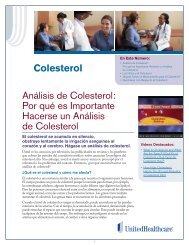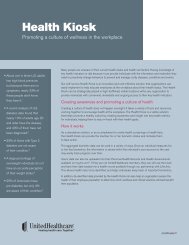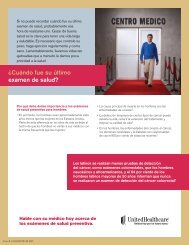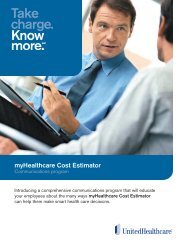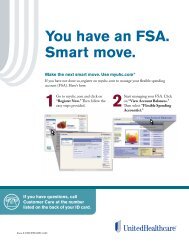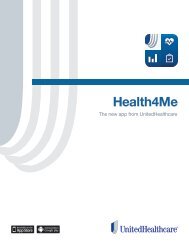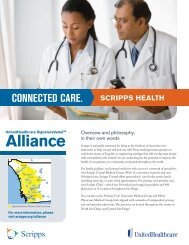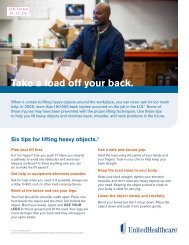Alcohol Awareness newsletter
Alcohol Awareness newsletter
Alcohol Awareness newsletter
Create successful ePaper yourself
Turn your PDF publications into a flip-book with our unique Google optimized e-Paper software.
<strong>Alcohol</strong><br />
<strong>Awareness</strong><br />
When Does <strong>Alcohol</strong><br />
Abuse Become <strong>Alcohol</strong>ism?<br />
You might know someone like Terry. She has<br />
a good job and always makes time for her<br />
family and friends. She even does volunteer<br />
work at her children’s school. In short, she’s a<br />
really great person.<br />
Terry also abuses alcohol.<br />
It’s not easy to pinpoint the moment when someone<br />
starts having a problem with alcohol. Instead of<br />
clear lines, there are shades of gray between social<br />
drinking, alcohol abuse and alcoholism. For some<br />
people, abuse begins before they – or their family –<br />
know it’s happening.<br />
In Terry’s case, one glass of wine after dinner<br />
turned into four. To keep her family from<br />
worrying, she hid the empty wine bottles.<br />
Covert behavior like this is one sign that someone<br />
has a drinking problem.<br />
} When Does <strong>Alcohol</strong> Abuse<br />
Become <strong>Alcohol</strong>ism?<br />
} Helping Kids Say “No” to Drugs<br />
and <strong>Alcohol</strong><br />
} Recognizing the Signs of <strong>Alcohol</strong>ism<br />
} How Genetics Can Influence Your<br />
Risk of Drug and <strong>Alcohol</strong> Addiction<br />
Heavy drinkers may appear to function day to day yet still<br />
be putting themselves and others at risk. Learn how to<br />
recognize problem drinking.<br />
Knowing your limits<br />
For men, experts define heavy drinking as more<br />
than two drinks per day on a regular basis. For<br />
women, it’s an average of more than one drink per<br />
day. But it may still be hard to tell when drinking<br />
has become a problem.<br />
Drinking is common in our culture, and some<br />
people do it without harmful effects. For others,<br />
drinking escalates until they lose their health and<br />
put themselves and others in danger.<br />
The reasons for these differences are complex.<br />
People with a family history of alcoholism are<br />
more likely to have addiction problems. So are<br />
those who face depression or some other mental<br />
illnesses. Your upbringing and social environment<br />
may also make a difference.<br />
1 1<br />
In This Issue:
<strong>Alcohol</strong> <strong>Awareness</strong><br />
Losing control<br />
<strong>Alcohol</strong> abuse on a small scale can lead to full-blown<br />
alcoholism. People who continue to abuse alcohol often<br />
find they have to drink more to get the same effect. This<br />
warning sign of alcoholism is called tolerance. In time you<br />
may need a drink just to feel normal. These signs add up<br />
to dependence – a hallmark of alcoholism.<br />
It’s best to uncover problems before they get that far. Your<br />
drinking may be putting you at risk for alcoholism if:<br />
You know alcohol is damaging your relationships and your<br />
health, but you drink anyway.<br />
You repeatedly neglect important work and family<br />
functions – for example, missing your kids’ events or<br />
deadlines at work.<br />
You have legal troubles, such as getting arrested for<br />
driving under the influence (DUI) or being drunk<br />
and disorderly.<br />
Getting help<br />
The effects of alcoholism can be devastating. Heavy<br />
drinkers are more likely to have heart disease, liver<br />
disease, depression and several types of cancer. Family<br />
and work relationships usually suffer. And of course,<br />
drinking too much alcohol on even one occasion can<br />
lead to injuries or death from a car crash, drowning or<br />
other type of accident.<br />
When Terry’s family realized she was losing control of<br />
her drinking, they persuaded her to get help. Your<br />
doctor is a good place to start finding the counseling or<br />
treatment you need. You can also contact the National<br />
Drug and <strong>Alcohol</strong> Treatment Referral Routing Service<br />
at 1-800-662-HELP (4357).<br />
Helping Kids Say “No”<br />
to Drugs and <strong>Alcohol</strong><br />
Believe it or not, your kids listen when you tell<br />
them about the hazards of substance abuse.<br />
Learn to talk to them about the dangers.<br />
Teens have a way of making their parents feel pretty<br />
useless at times. But whether you know it or not, you<br />
are the biggest influence in your children’s lives when<br />
it comes to drugs and alcohol. About 2 out of 3 kids<br />
ages 13 to 17 say that one of the main reasons they<br />
don’t do drugs is that their parents would be<br />
disappointed in them.<br />
Here are some ways you can help your kids avoid<br />
tobacco, alcohol, and other drugs:<br />
Know their friends.<br />
Teens are usually offered drugs by friends. Get to know<br />
your children’s friends and their parents. Ask where your<br />
kids are going when they leave the house, who they’ll be<br />
with, and what they’ll be doing. Let them know you’ll be<br />
checking on them.<br />
Be involved.<br />
The “danger zone” for drug use is between 4 p.m. and<br />
6 p.m. So try to be there when your children get home<br />
from school. If you can’t be there, call. Get them involved<br />
in supervised after-school and summer activities. Bored<br />
kids are more likely than others to get in trouble.<br />
Talk to your kids about drugs.<br />
Tell them often that you don’t ever want them to use<br />
tobacco, alcohol, or other drugs. Listen, too. If you’re a<br />
good listener, your child is more likely to talk to you<br />
about drugs.<br />
Establish rules.<br />
Set a curfew and enforce it. Let your kids know what the<br />
consequences will be if they drink or do drugs. Reward<br />
good behavior.<br />
2 2
<strong>Alcohol</strong> <strong>Awareness</strong><br />
Be a good role model.<br />
Kids learn a lot by watching their parents. If you have a<br />
substance abuse problem, get help so you can set a good<br />
example for your children.<br />
Teach your kids how to handle peer pressure.<br />
One strategy kids can use to stay clear of drugs and alcohol<br />
is REAL: Refuse, Explain, Avoid, Leave.<br />
} Refuse. A simple “no” often works.<br />
} Explain. A teen might say “I can’t risk getting kicked<br />
off the team” or “Smoking makes me sick.” Be firm but<br />
polite.<br />
} Avoid. Teens can decide to stay away from parties where<br />
drugs are likely to be used.<br />
} Leave. If teens are feeling pressured, they can learn to<br />
just walk away. Or they can suggest another activity, such<br />
as playing a sport or going to a movie.<br />
Recognizing the<br />
Signs of <strong>Alcohol</strong>ism<br />
Do you worry that you or someone<br />
you love may have a drinking<br />
problem? Learn how to recognize<br />
the signs of alcoholism.<br />
Having a glass of wine with dinner every night or<br />
drinking a few beers at a ball game doesn’t mean that<br />
you have an alcohol problem – does it? Drinking in<br />
moderation – up to one drink a day for women and no<br />
more than two drinks a day for men – may be no cause<br />
for concern. But unless you examine your drinking<br />
habits, how can you be sure?<br />
It can be hard to tell how alcohol is affecting your life.<br />
For one thing, people often have a hard time admitting<br />
they drink too much. But ignoring how you use alcohol<br />
can do serious harm to your health.<br />
Why worry?<br />
Heavy drinking raises your risk of certain types of stroke<br />
and cancer. It also can cause other diseases and conditions,<br />
including cirrhosis (scarring of the liver), pancreatitis,<br />
stomach ulcers, malnutrition, and problems with your<br />
immune system.<br />
Your alcohol use also can put others at risk. For instance,<br />
drinking during pregnancy can cause fetal alcohol<br />
syndrome – a range of various birth defects. It can also<br />
cause serious physical, mental, and behavioral problems for<br />
your baby. Drinking and driving puts everyone on the road<br />
in danger.<br />
A blood alcohol concentration (BAC) of 0.02 percent can<br />
impair driving skills. If a 160-pound man drinks just two<br />
beers, his BAC will be twice that amount, or 0.04. Driving<br />
starts to be impaired at this level. Smaller people can reach<br />
this level by drinking even less.<br />
Review your risk<br />
At every age, men are more likely than women to have<br />
drinking problems. <strong>Alcohol</strong>ism also runs in families.<br />
However, having a parent with alcoholism doesn’t always<br />
mean you’ll have it, too.<br />
Have a heart-to-heart<br />
Ask friends and family about how they view your drinking.<br />
They may have noticed that you’re anxious or depressed.<br />
Or they may see that you’re not sleeping well, you lack<br />
self-esteem, or you’re not doing well at work. Plus, you<br />
may have been in traffic accidents or gotten tickets<br />
because of your drinking. These are all possible signs<br />
of a drinking problem.<br />
3 3
<strong>Alcohol</strong> <strong>Awareness</strong><br />
Ask yourself these questions:<br />
} Have I ever felt I should cut down on my drinking?<br />
} Have people annoyed me by criticizing the amount of<br />
alcohol I consume?<br />
} Have I ever felt guilty or bad about my drinking?<br />
} Have I ever had a drink first thing in the morning to<br />
steady my nerves or get rid of a hangover?<br />
} Even one “yes” answer may be a sign of a drinking<br />
problem. More than one “yes” makes it more likely that<br />
your drinking is a problem.<br />
Reach for recovery<br />
Talk with your doctor if you’re worried about your<br />
drinking. <strong>Alcohol</strong>ism can be treated with therapy.<br />
Sometimes medication is prescribed for withdrawal and<br />
cravings.<br />
Successful recovery depends on abstaining from alcohol<br />
for the rest of your life. This sounds like a tall order, but<br />
avoiding events with alcohol and keeping alcohol out of<br />
your home can help. So can the support of your family<br />
and friends as well as others who are recovering from<br />
alcoholism.<br />
How Genetics Can Influence Your<br />
Risk of Drug and <strong>Alcohol</strong> Addiction<br />
Your family history offers important insight into your risk of becoming addicted<br />
to alcohol or other drugs.<br />
It’s easy to think about inheriting the positive traits of<br />
your relatives. After all, who wouldn’t want the gene that<br />
gave Mom her perfect smile or Uncle Mike his all-star<br />
skills on the basketball court?<br />
But what if your dad – or his dad – lived much of his life<br />
with an alcohol problem? Evidence shows there is a link<br />
between genes and substance abuse. In fact, an estimated<br />
40 percent to 60 percent of what makes a person<br />
vulnerable to addiction is linked to genetics.<br />
Some of these factors include:<br />
} Mental health. Disorders such as depression raise<br />
your risk.<br />
} Environmental factors. Risk goes up when you’re<br />
around others who have substance abuse problems. The<br />
lifestyles of your parents and other family members are a<br />
strong influence.<br />
You might be worried that genes linked to alcoholism<br />
may have been passed on to you. But keep in mind there<br />
are ways you can reduce your risk.<br />
What’s the connection?<br />
When it comes to alcohol, research has found that some<br />
genes affect both how much people consume and their<br />
risk of becoming dependent on it. Other genes affect<br />
dependence alone. Statistically, children of alcoholics are<br />
about four times more likely than the general population<br />
to have an alcohol problem in their lifetime.<br />
These numbers might suggest that your fate is set if<br />
there’s a history of drug or alcohol issues in your family.<br />
But it isn’t. No single factor – including your genetic<br />
makeup – determines your risk of addiction. Many things<br />
come into play, and they often interact. In general, the<br />
more risk factors you have, the greater the danger.<br />
4 4
} Age at first use. The earlier you start using drugs or<br />
alcohol, the greater your risk of becoming addicted to<br />
them.<br />
} Method of administration. Smoking a drug or<br />
injecting it raises the odds that you’ll get hooked.<br />
Protect yourself<br />
} Discourage underage use. <strong>Alcohol</strong> use by minors<br />
and the use of illicit drugs (by anyone) are illegal and<br />
should be avoided. Talk with your kids about the risks.<br />
And be a good role model.<br />
} Drink in moderation – if at all. If you choose to<br />
drink, it’s best to have no more than one drink a day<br />
if you’re a woman, or two drinks a day if you’re a man.<br />
Be aware that drinking in moderation may be harder<br />
for someone who has a family history of alcoholism.<br />
Avoiding alcohol entirely may be the best policy for<br />
some people.<br />
} Talk with your doctor. He or she can tell you more<br />
about your risk of addiction or help you if you think<br />
you have a problem.<br />
© 2012 United HealthCare Services, Inc.<br />
UHCEW571621-000<br />
5


